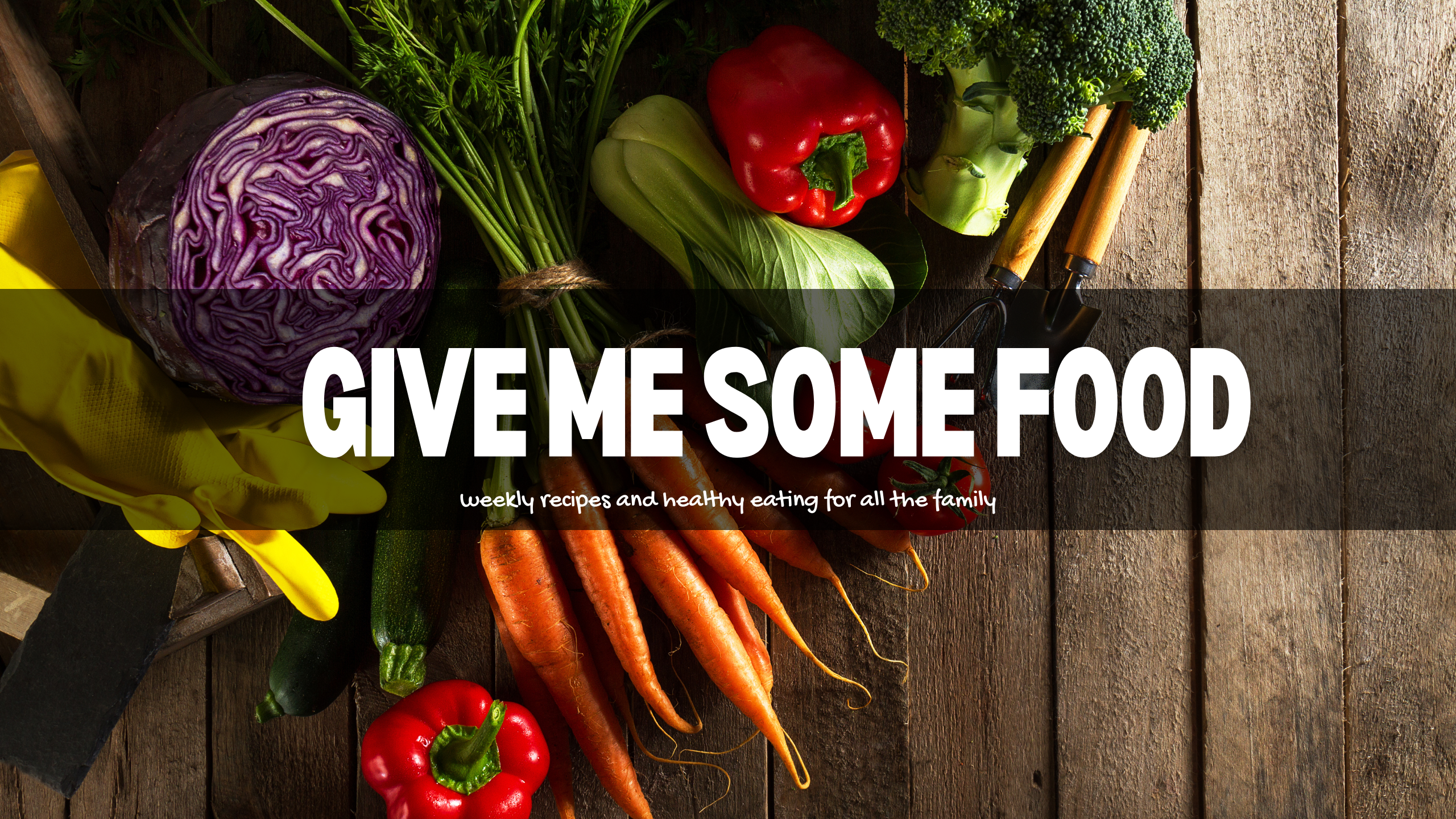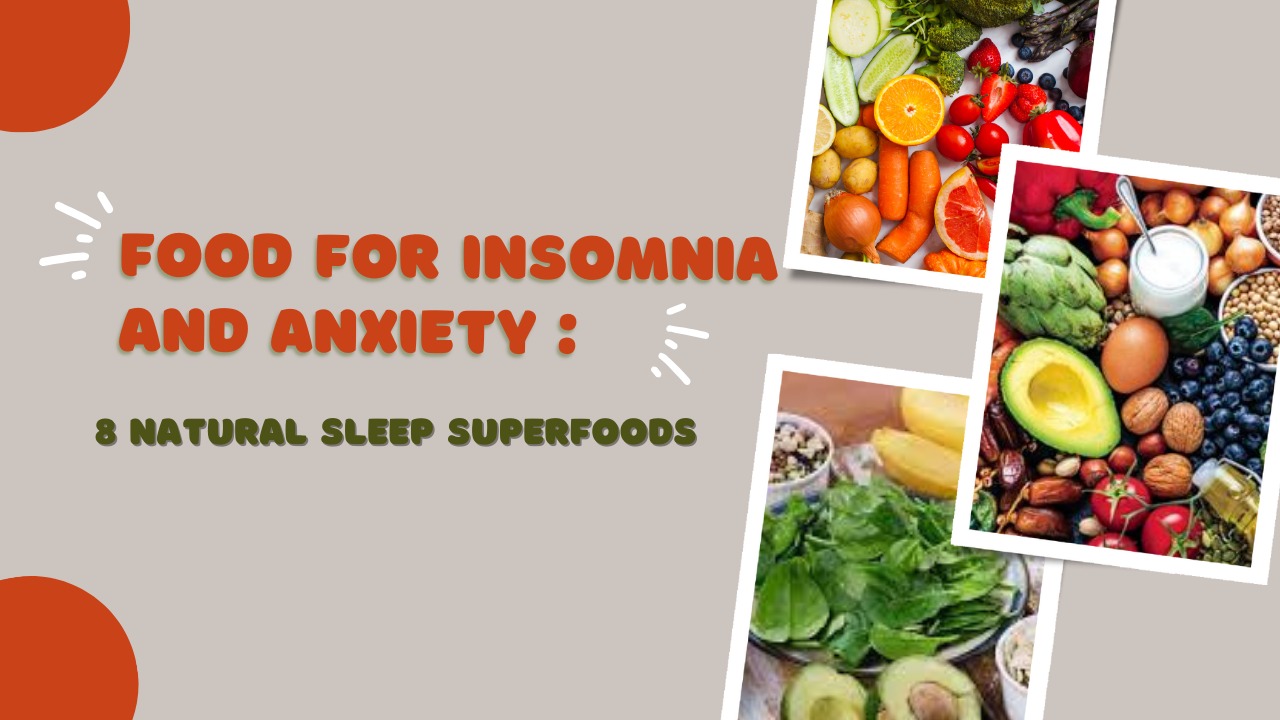Dealing with insomnia and anxiety can be overwhelming, especially when they occur together. Many people don’t realize that the food they eat can influence their sleep and mood. Certain nutrients found in everyday foods can help relax the body and calm the mind. These include magnesium, tryptophan, B vitamins, and omega-3 fatty acids, which support brain health and help produce calming hormones like serotonin and melatonin.
Eating the right kinds of food can naturally ease anxiety and improve sleep quality. Foods such as almonds, leafy greens, oats, bananas, fatty fish, and herbal teas are known to have calming effects. They help regulate stress levels and promote relaxation. Having a balanced diet filled with these foods can make it easier to fall asleep and feel more at ease throughout the day.
At the same time, it’s important to avoid foods that may make symptoms worse. Caffeine, sugar, alcohol, and processed snacks can trigger anxiety and disturb your sleep cycle. By making simple changes to your eating habits, you can support both your emotional well-being and restful sleep. Choosing food wisely is a natural and safe way to manage insomnia and anxiety in the long run.
In this article, we’ll explore how food affects mental health, and we’ll delve deep into the top 8 scientifically-backed foods that naturally combat both insomnia and anxiety.

How Are Insomnia and Anxiety Connected ?
Before diving into the foods, it’s essential to understand the relationship between insomnia and anxiety.
Anxiety often causes a state of hyperarousal, where your brain is too active to allow you to fall asleep. This can lead to difficulty falling asleep, staying asleep, or waking up feeling unrested. On the other hand, chronic insomnia can increase stress levels, reduce emotional resilience, and make you more prone to anxiety.
It’s a two-way street. The more anxious you are, the worse you sleep—and the worse you sleep, the more anxious you become. This creates a loop that is difficult to break.
This is where nutritional psychiatry comes in. It studies how diet affects mental health. Certain nutrients—like magnesium, tryptophan, B vitamins, and omega-3 fatty acids—play a crucial role in brain function, neurotransmitter production, and hormone regulation. By incorporating foods rich in these nutrients, you can naturally support both your mood and your sleep.
🥗 Top Foods for Insomnia and Anxiety Relief
Pumpkin Seeds (Pepitas)
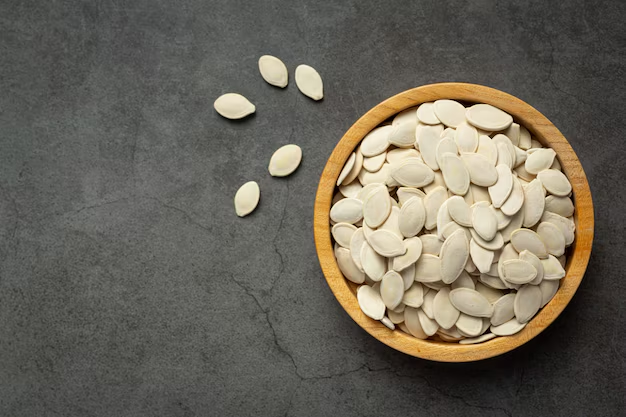
Pumpkin seeds are a powerful yet often overlooked food for insomnia and anxiety. They are rich in magnesium, zinc, and tryptophan—three key nutrients that support relaxation, better sleep, and emotional balance. These seeds offer a natural way to calm the body and mind without needing medication.
Magnesium helps ease muscle tension and quiet the nervous system, making it easier to fall asleep. Zinc plays an important role in turning tryptophan into serotonin and melatonin—hormones that regulate mood and sleep. Tryptophan itself is an amino acid that the body uses to make these calming chemicals.
Many people with insomnia or anxiety have low magnesium levels. Eating just a small handful of pumpkin seeds can help meet your daily magnesium needs. Adding them to your meals or snacks is a simple and healthy way to improve sleep quality and reduce stress naturally with food for insomnia and anxiety.
How to enjoy
Sprinkle on salads or soups
Mix into granola or yogurt
Blend into smoothies
Tip: Eat them roasted and unsalted for maximum health benefit
Avocados
Avocados are a creamy and nutritious food that can support better mental and emotional health. As a top food for insomnia and anxiety, they are packed with healthy monounsaturated fats, B vitamins, folate, and potassium. These nutrients help improve brain function, ease stress, and promote a balanced mood.
One of the key nutrients in avocados is vitamin B6, which is important for producing brain chemicals like serotonin and GABA. These neurotransmitters help calm the mind and promote relaxation, both of which are essential for better sleep and reduced anxiety.
Potassium in avocados also plays a helpful role by keeping blood pressure in check and reducing symptoms like a fast heartbeat and tense muscles. Adding avocados to your diet is a simple way to support both sleep and stress relief naturally with food for insomnia and anxiety.
How to enjoy
Avocado toast with whole-grain bread
Blended into smoothies
Added to salads or grain bowls
Tip: Combine with foods rich in tryptophan to improve serotonin conversion.
Kiwi
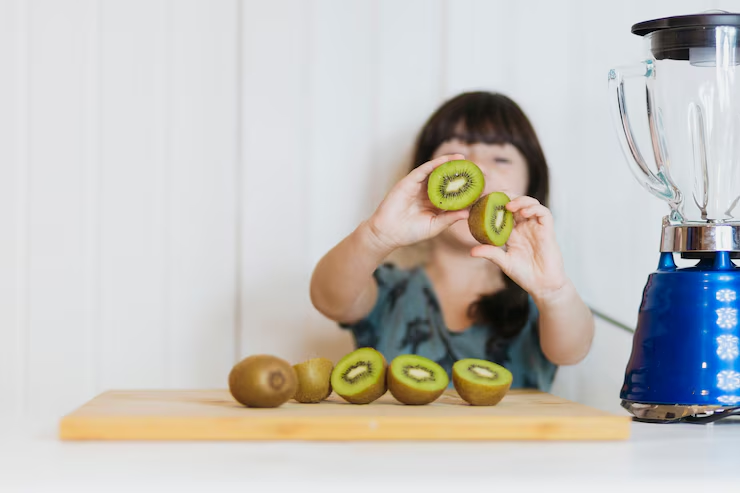
Kiwis are a refreshing and nutrient-packed fruit that can be a helpful food for insomnia and anxiety. They are rich in vitamin C, folate, antioxidants, and serotonin—all of which support better sleep and emotional well-being. Their natural combination of nutrients helps calm the body and mind before bedtime.
A study from Taiwan found that eating two kiwis an hour before sleep greatly improved both sleep quality and how long people slept. This makes kiwi a simple and effective addition to any evening routine for those struggling with sleep issues.
One of the key benefits of kiwi is its high serotonin content. Serotonin helps regulate mood and supports the body’s ability to relax and fall asleep more easily. Including kiwi in your diet may offer a natural and tasty way to ease anxiety and promote restful sleep using food for insomnia and anxiety.
How to enjoy
Fresh sliced kiwi as a bedtime snack
Mixed into fruit salads
Blended into juice with other sleep-friendly fruits
Tip: Eat them with the skin (washed well) to benefit from extra fiber and nutrients.
Turmeric (with Black Pepper)
Turmeric is a golden spice known for its powerful health benefits and is a valuable food for insomnia and anxiety. It contains curcumin, a natural compound with strong anti-inflammatory and antioxidant properties. Curcumin helps reduce brain inflammation caused by stress, which may improve mood and emotional balance.
Research suggests that curcumin supports better regulation of brain chemicals linked to depression and anxiety. This can lead to a calmer state of mind and fewer mood swings. To increase its effectiveness, it’s helpful to add a small amount of black pepper, which boosts curcumin absorption by up to 2000%.
Turmeric may also promote better sleep by reducing stress-related inflammation that can interfere with rest. Adding it to warm drinks or meals is an easy way to support both sleep and mental well-being with food for insomnia and anxiety.
How to enjoy
Golden milk (turmeric latte)
Add to soups, curries, or rice dishes
Mix with honey and warm water as a night drink
Tip: Take turmeric with healthy fat (like coconut milk) for better absorption.
Spinach and Other Leafy Greens
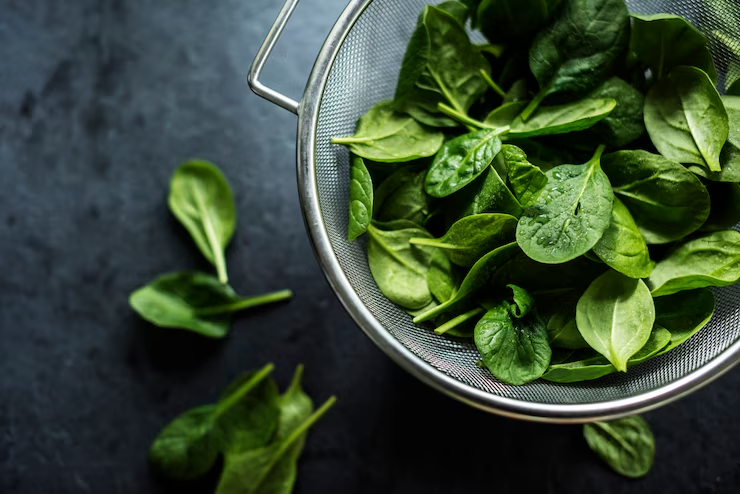
Leafy greens like spinach, kale, and Swiss chard are powerful foods for insomnia and anxiety. They are rich in magnesium, folate, and iron—nutrients that support healthy brain function and mood balance. These greens help keep the nervous system calm and promote emotional well-being naturally.
Magnesium in leafy greens helps relax muscles and nerves, making it easier to unwind and fall asleep. Folate supports the production of dopamine and serotonin, two important chemicals that regulate mood and reduce anxiety. Eating these vegetables regularly can support both mental and physical relaxation.
Low levels of magnesium, folate, or iron are often linked to depression, anxiety, and sleep issues. In particular, iron deficiency—especially in women—can cause tiredness, restlessness, and poor sleep. Adding leafy greens to your meals is a simple way to support your mental health with food for insomnia and anxiety.
How to enjoy
Sautéed with garlic and olive oil
Blended into green smoothies
Added to omelets, wraps, or grain bowls
Tip: Pair with a vitamin C-rich food (like lemon or bell peppers) to boost iron absorption.
Eggs
Eggs are a nutrient-rich food for insomnia and anxiety, offering many benefits for both sleep and mental health. They are a complete protein source and contain key nutrients like tryptophan, vitamin D, choline, and B vitamins. These nutrients work together to support emotional balance and restful sleep.
Vitamin D in eggs helps boost the effects of melatonin, the hormone responsible for regulating sleep-wake cycles. Choline supports brain function and nerve health, which can improve focus and reduce feelings of stress or tension.
Eggs are also high in tryptophan, an amino acid that helps the body produce serotonin and melatonin. These brain chemicals promote a calm mood and make it easier to fall asleep. Adding eggs to your diet is an easy and effective way to support your well-being with food for insomnia and anxiety.
How to enjoy
Hard-boiled eggs as a snack
Scrambled with spinach and tomatoes
Added to rice bowls or salads
Tip: Choose free-range or pasture-raised eggs for higher omega-3 content.
Walnuts
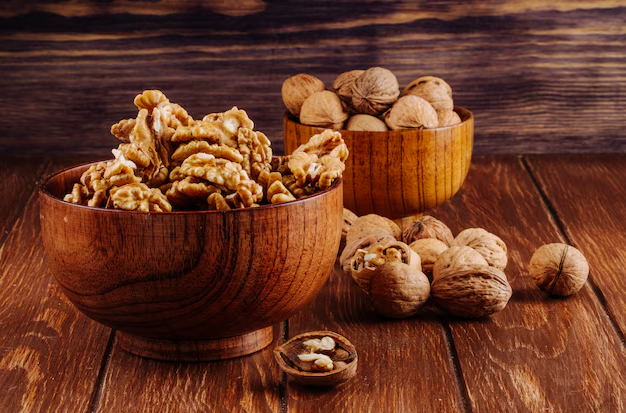
Walnuts are a highly effective food for insomnia and anxiety, thanks to their unique nutrient profile. They are one of the few nuts that naturally contain melatonin, the hormone that regulates sleep. Eating a small handful before bed can help support deeper and more restful sleep.
Along with melatonin, walnuts are rich in omega-3 fatty acids, particularly alpha-linolenic acid (ALA). These healthy fats are known to reduce symptoms of anxiety and depression while also supporting brain function. Their antioxidant content helps fight inflammation, which can affect both mood and sleep.
Another benefit of walnuts is their ability to help regulate blood sugar levels. Stable blood sugar is important for avoiding mood swings and reducing nighttime awakenings. Including walnuts in your daily diet is a simple and natural way to care for your emotional and sleep health using food for insomnia and anxiety.
How to enjoy
Crushed on oatmeal or yogurt
Mixed into trail mix
Added to baked goods or smoothies
Tip: A small handful (about 1 ounce) before bed can promote sleepiness.
Chamomile-Infused Honey
Raw, natural honey is a gentle and effective food for insomnia and anxiety. It helps trigger the release of insulin, which allows tryptophan to enter the brain more easily. Tryptophan supports the production of calming brain chemicals like serotonin and melatonin, promoting better mood and restful sleep.
When paired with calming herbs like chamomile or lavender, honey becomes a powerful bedtime remedy. A warm drink made with these ingredients can help relax the mind, ease tension, and prepare the body for sleep. This simple combination is both soothing and natural.
Honey also provides a steady source of fuel for the liver during the night, helping to prevent blood sugar drops that can cause you to wake up. While it isn’t a full meal, honey pairs well with other calming foods and supports better sleep naturally with food for insomnia and anxiety.
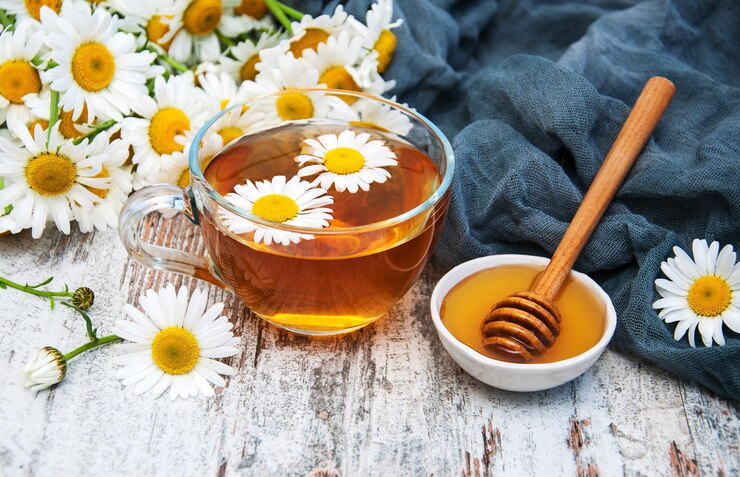
How to enjoy
A spoonful in chamomile or lavender tea
Drizzled over yogurt or fruit
Mixed with warm milk as a nightcap
Tip: Use raw or manuka honey for additional antibacterial and antioxidant benefits.
🌙 Creating a Food Routine to Support Sleep & Calmness
| ✅ Time of Day | ✅ Focus | ✅ Food Suggestions |
|---|---|---|
| Morning Routine | Start your day with foods that stabilize blood sugar and lower cortisol | – Scrambled eggs with spinach and whole-grain toast – Smoothie with avocado, banana, and Greek yogurt – Oatmeal topped with walnuts and berries |
| Afternoon Boost | Choose foods that reduce stress and prevent energy dips | – Mixed greens salad with pumpkin seeds and salmon – Whole grain wrap with turkey, spinach, and hummus – Kiwi or a few slices of dark chocolate |
| Evening Wind-Down | Eat foods that support relaxation and better sleep | – Grilled chicken or tofu with steamed greens and quinoa – Banana with chamomile honey or a warm turmeric drink – Tart cherry juice or a kiwi as a bedtime treat |
Foods to Avoid if You Struggle with Anxiety or Insomnia
Just as some foods help, others hinder. Consider limiting the following:
Caffeine (especially after 2 PM)
Alcohol (disrupts sleep architecture)
Refined sugar (causes mood crashes)
Fried and processed foods (linked to inflammation)
Artificial additives (can trigger hyperactivity in some people)
Conclusion

In the journey to better sleep and mental well-being, the role of diet is both profound and often underestimated. Incorporating the right food for insomnia and anxiety into your daily routine can naturally calm your mind, balance your mood, and promote restorative sleep.
From magnesium-rich seeds and leafy greens to serotonin-boosting fruits and calming herbal infusions, these nutrient-packed foods offer a gentle yet effective way to support your nervous system. By making mindful dietary choices—alongside healthy sleep habits—you can begin to break the cycle of restlessness and stress.
Remember, consistency is key. Eating these healing foods regularly, especially in the evening, can make a significant difference in how you feel day and night. So instead of reaching for a sleeping pill or battling anxious thoughts alone, consider reaching for nature’s pharmacy—the foods on your plate. Better sleep and calmer days could be just a meal away.
FAQs
- What foods help with both insomnia and anxiety ?
Foods rich in magnesium, tryptophan, omega-3 fatty acids, and B vitamins—like walnuts, kiwi, spinach, and eggs—can calm the mind and support better sleep. - When is the best time to eat these foods for maximum benefit ?
Calming foods are best eaten in the evening or a few hours before bed to help your body relax and prepare for sleep. - Can certain foods make anxiety and insomnia worse ?
Yes, foods high in sugar, caffeine, and processed ingredients can increase stress levels and disrupt sleep. - Is it okay to snack before bed if I have trouble sleeping ?
Yes, light snacks like banana with honey or a few nuts can help maintain blood sugar and promote melatonin production. - Do I need to avoid all caffeine if I have anxiety ?
It’s best to limit caffeine, especially in the afternoon and evening, as it can worsen anxiety and delay sleep.
